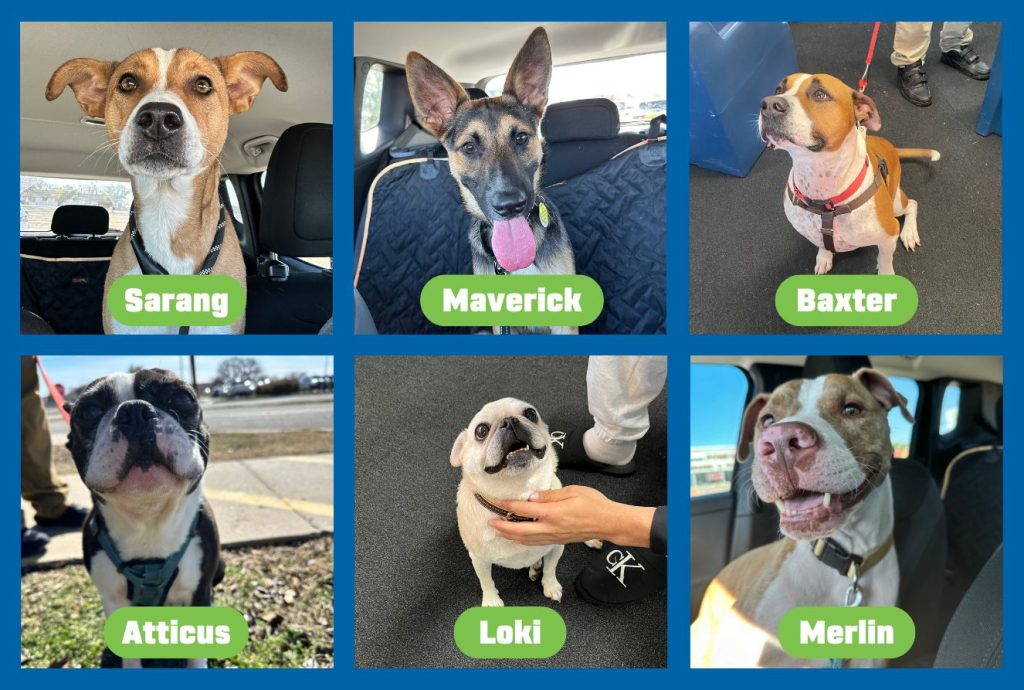Dallas Pets Alive (DPA) recently partnered with Texas Juvenile Justice Department’s BARK program at Gainesville State School, providing the young residents there with a warm and furry opportunity to help support dogs in need of temporary foster care and helping DPA extend fostering help to people with acute needs.
This collaboration is creating a three-fold virtuous circle that benefits the dogs, their owners in need of pet foster care, and the youth caregivers.
The BARK Dorm
The Building Attachment and Resilience K-9 (BARK) program teaches the youth valuable life skills, patience, and responsibility through caring for and training dogs in need of temporary foster care.
The program aims to uplift spirits and reward perseverance, by fostering mutual caring connections and providing youth with the opportunity to lead the charge on a project that has a positive impact. BARK also gives the youth residents a positive incentive to continue improving, as they must earn the ability to participate in the program through positive behavior reports and measurable progress in school.
To prepare for the BARK program, TJJD provided staff members with trauma-informed dog training classes by Roman Gottfried, owner of Roman’s Holistic Dog Training. The training emphasizes understanding dogs’ past traumas and using compassionate approaches to address behavioral issues, mirroring the philosophy of how staff work with youth at TJJD.

Baxter, Maverick, Atticus, Loki, Merlin, and Sarang were the first six canine residents of the BARK dorm at Gainesville, accompanied by 12 young men who work in pairs to care for and train them. The program focuses on teaching responsibility and building essential life skills by having the youth actively participate in the dogs’ daily care and training.
How BARK Extends the Reach and Impact of DPA’s PASS Program
Lisa Broussard, coordinator of BARK, chose to partner with Dallas Pets Alive for the unique initiative of DPA’s Positive Alternatives to Shelter Surrender (PASS) program, which assists people in need of temporary foster care for their pets during times of crisis or transition. These often include pet owners facing extreme financial hardship or homelessness, entering recovery or other in-patient medical treatments, seeking safety from domestic violence, and more. The collaboration between Gainesville State School and DPA not only benefits the dogs’ owners but also contributes to the wider community by keeping these canines out of overcrowded shelters.
Leslie Sans, Executive Director and Founder of Dallas Pets Alive, emphasized the dire need for the PASS program in the community, stating, “We receive so many inquiries for help from people who are in crisis that do not want to surrender their pets. People don’t want to let go of their best friend — and they shouldn’t have to — when they’re going through a crisis.” Sans further expressed enthusiasm for the partnership with TJJD’s Gainesville State School, stating, “DPA is all about collaboration and innovation, and this is a prime example of that.” The program serves as a meaningful service opportunity for the youth, who act as temporary foster care providers while working to turn their lives in a new direction.
Through weekly virtual training sessions with GoodPup, a partnering program of DPA, the youth receive guidance on dog training techniques and have the chance to voice their questions to expert dog trainers. This hands-on experience allows them to develop patience, understanding, and responsibility as they learn the skills they need to train the dogs and establish a relationship with them based on mutual respect and understanding. “The benefit is they have to figure out and implement and do all the training themselves, with the guidance of the virtual trainer. They have to learn the skills,” said Sarah McGoldrick, Vice President of Animal Operations for Dallas Pets Alive.
The Dallas Pets Alive and BARK collaboration not only transforms the lives of the youth but also addresses a community need by providing temporary foster care for dogs in crisis situations.
“They deserve a second chance,” said Sans, thinking of the young men participating in the program, the dogs under their temporary care, and the pet owners in need. “Everybody’s getting a second chance because of the BARK dorm.”
The BARK program exemplifies the positive impact that collaboration between organizations and the community can achieve.
About the Texas Juvenile Justice Department (TJJD)
The Texas Juvenile Justice Department operates five secure facilities and three halfway houses serving youth up to age 18 who’ve committed felony-level offenses and been assigned by juvenile court judges to a program of rehabilitation at TJJD.
Youth at TJJD campuses attend school and specialized therapeutic programming as determined by their courts and TJJD professionals. Therapeutic programming at Gainesville State School includes the BARK program, which is open to youth who’ve progressed in treatment. BARK is one of several activities across the agency offering skills training and incentives for the youth. TJJD also provides opportunities to play on TAPPS sports teams, earn occupational certificates and take classes in horticulture, woodworking, gardening, and girls empowerment.
TJJD also monitors, advises and administers state funding to county juvenile probation departments and facilities, working in tandem with local authorities to keep youth in local care and as shallow in the system as possible.
About the PASS Program (Positive Alternatives to Shelter Surrender)
Since 2016, PASS has assisted 16,509 pet owners and has prevented 2,679 animals from being surrendered to local shelters. The Positive Alternatives to Shelter Surrender (PASS) Program is the only program of its kind in North Texas. The PASS Program partners with local shelters to provide resources to pet owners before they reach the doors of the shelter. Volunteers connect pet owners to life-saving resources to help pets stay in their homes, and out of the shelters. Learn more about the PASS Program.




